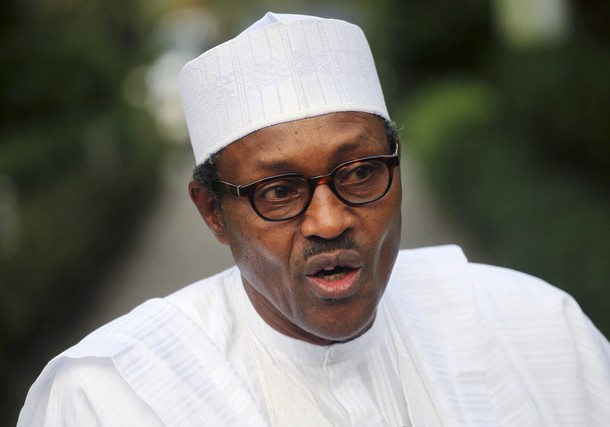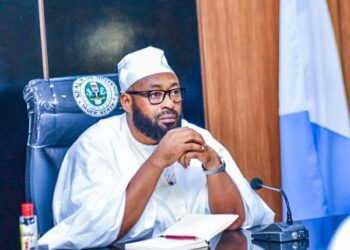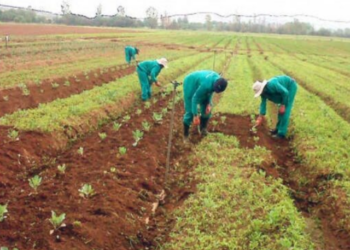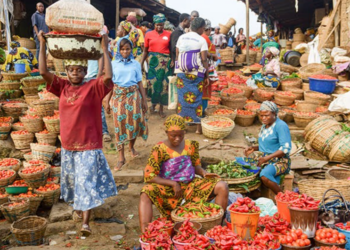Behold the men and women who will chart the course for the government of General Muhammadu Buhari, who assumes office on May 29. These men, made up of a blend of old and new generation, were chosen after weeks of consultation and character evaluation and were drawn from the country’s six geo-political zones to make up the transition committee
Ahmed Joda
The chairman of the 18-member transition committee, nominated by the President-elect, General Muhammadu Buhari, and Ahmed Joda is an administrator, journalist and politician. He is a former permanent secretary in the Northern Nigerian public service, Federal Ministry of Information, Ministry of Education and the Federal Ministry of Industries.
He was among a class of super permanent secretaries in the 1970s that played a major role during the Nigerian Civil War. In the 1960s, he worked with Ahmadu Bello in the Northern regional government.
In 1999, he headed a committee on assessment of Federal Government parastatals and also a panel on poverty alleviation. He currently serves as the chairman of ABTI-American University of Nigeria, Yola and is the principal founder of Benue Valley Farms.
Joda was born in Girei in Adamawa State. He attended Yola Elementary and Middle schools before proceeding to Barewa College. In the 1950s, he attended Pitman College, London and gained practical experience in journalism while staying in Britain.
After completing his secondary education in 1948, he was admitted to Moor Plantation, Ibadan. He worked briefly at an agricultural centre in Yola before entering the field of journalism at Gaskiya Corporation, Zaria. He later worked for the Nigerian Broadcasting Commission serving as the editor of NBC Kaduna and then joined the Northern Nigeria civil service as Chief Information Officer and later permanent secretary in the regional Ministry of Information. In 1967, he became a federal permanent secretary in the Ministry of Information and subsequently moved to Lagos.
After, the civil war, he was seconded to the Ministry of Education when the ministry was involved in rehabilitation of facilities in the old East Central State, launching of the Universal Primary Education and the establishment of the Nigerian Universities Commission. In the mid 1970s, he became permanent secretary in the Ministry of Industry at a time the Nigerian government was trying to launch a national steel programme. He has also served as chairman and board member of various bodies including the Nigerian National Petroleum Corporation, Nigerian Communications Commission, Pastoral Resolve, SCOA, Nigeria, Chagouri and Chagouri Construction, Flour Mills, Nigeria, and the Nigerian LNG.
Doyin Salami
Dr. Doyin Salami, the vice-chairman of the committee, holds a PhD from Queen Mary College, University of London.
He is a member of the Monetary Policy Committee of the Central Bank of Nigeria and had been a member of the Federal Government’s Economic Management Team.
He is currently a full-time member of the faculty at Lagos Business School (LBS), where he is senior lecturer. In addition, he is also an executive director of the UK-based African Business Research Ltd. At LBS, he leads sessions in economic environment of business and had also served as director of programmes for five years until January 2005. Dr. Salami’s research interests include: issues in corporate long-term financial management; macroeconomic policy; corporate competitiveness and risk management; and characteristics of small and medium enterprises (SMEs).
In addition to teaching, Salami is a consultant. His consulting activities included assignments for the Department for International Development (DFID), World Bank, United Nations Industrial Development Organisation (UNIDO) and United States Agency for International Development (USAID).
Presently, he is retained as a consultant by British American Tobacco (BAT), BGL Securities Ltd; Coca-Cola Nigeria and Equatorial Africa (CCNEAL), Kakawa Discount House and he has facilitated or participated in corporate retreats for Zain Nig Ltd., MTN, and African Petroleum Plc., among others.
Tam David West
Prof. Tam David West is a former minister of petroleum and energy under General Muhammadu Buhari military government between 1984–1985, and minister of mines, power, and steel under the regime of General Ibrahim Babangida (1986). He was eventually removed as minister and arrested by the Babangida regime for allegedly contributing to the economic adversity of the country. He was discharged and acquitted of these charges by Nigeria’s Special Appeal Court on August 8, 1991.
He had earlier served as commissioner of education and a member of the Executive Council of Rivers State (1975–1979), as a member of the 50-person Constitution Drafting Committee for the Federal Military Government of General Murtala Muhammed .
David-West was born in Buguma, Kalabari, in what is now Rivers State. He received his higher education at the University of Ibadan (1956-1958) and earned a BSc degree at Michigan State University (1958–1960), an MSc degree at Yale University (1960–1962), and a PhD degree at McGill University (1964–1966). David-West was consultant virologist and senior lecturer at the University of Ibadan in 1969 and was subsequently promoted to professor of virology in 1975.
Festus Odimegwu
Another member of the transition committee, Mr. Festus Odimegwu, is a former Managing Director of Nigeria Breweries Plc and immediate past chairman of the National Population Commission (NPC). He replaced Chief Samaila Makama at NPC.
Odimegwu was an appointee of President Goodluck Jonathan after he helped to rally the organised private sector to support the enthronement of the Umaru Yar’Adua presidency in which Mr. Jonathan served as vice president.
He remained close to President Jonathan, who appointed him chairman of the National Population Commission. He however left the position in controversial circumstances after he made comments considered critical of a section of the country.
While at the Nigerian Breweries, he embarked on a modernisation programme that has further strengthened the distance between NB and its competitors.
He also served as a Director of Dangote Cement Plc until March 2012. He served as Director of Union Bank of Nigeria Plc between 2004 and December 31, 2011. He served as Director of Transnational Corporation of Nigeria Plc. He graduated with B.Sc Chemistry from the University of Nigeria, Nsukka and M.Sc Brewing from Beriot Watt University, Edinburgh, UK.
He was Chairman & CEO, FS Group of Companies Ltd and a non-executive Chairman, Royal Lifestyle Services Group of Companies Ltd. Odimegwu was also a non-executive chairman of Quintessentially Nigeria Ltd.
Nike Aboderin
Nike Aboderin, a member of the committee is also a representative of the private sector on the transition committee.
Her private sector experience was majorly in the banking sector where she rose to the position of Group Head, Large Corporates at Skye Bank Plc in 2014. She also had a stint at Citibank Nigeria.
She was Special Adviser to the Ogun State governor between July 2011 and August 2014. She was a member of the executive council and was responsible for the trade and investment portfolio, reporting directly to the governor.
She was once Head, Treasury/ Financial Services of Premium Securities Ltd. (FBN (Merchant) Bank Ltd.)
Olawale Edun
Another private sector operator on the committee list is former commissioner of finance, Lagos State from 1999-2004. He has considerable experience in Economics and International Finance at national and international levels.
He worked at Chase Merchant Bank Nig. Limited (later Continental Bank Plc) – including spells at Lehman Brothers and Chase Manhattan Capital Markets, New York, USA and The World Bank / International Finance Corporation, Washington DC, USA .
He returned to Nigeria in 1989 as co-founder and executive director of Investment Banking and Trust Company (now Stanbic IBTC Bank Plc. He is the founder and current Chairman of Denham Management Limited (now Chapel Hill Denham Group). He serves on the board of African Paints Nigeria Plc, among others. He is also the Chairman, LiveWell Initiative, a health education and literacy non-government organisation (NGO) as well as Sisters Unite for Children – another NGO which assists street children.
Bola Adesola
Bola Adesola is a banker and a lawyer by profession. She joined Standard Chartered Bank Nigeria Limited in 2011 as the managing director/chief executive officer. Her main responsibilities include the provision of leadership for the Group in Nigeria, through the development of overall country strategy/direction; the provision of leadership on corporate governance issues; and the achievement of the overall country’s financial and headcount budgets.
Prior to joining Standard Chartered Bank, Adesola served in senior leadership capacities in Citibank, Nigeria and Tanzania for a period spanning over nine years. She also served as Managing Director of Kakawa Discount House Nigeria and executive director in First Bank Nigeria, with responsibility for managing the business in the Lagos Directorate including retail, corporate and commercial banking.
Muhammed Hayatudeen
Muhammed Hayatudeen is remembered as perhaps, the first Nigerian bank managing director to turn around a sick and dying financial institution.
He used his wealth of experience in 1992 to transform the hitherto dormant Federal Savings Bank into a thriving commercial bank.
His effort led to the establishment of the now defunct FSB International Bank.
Hayatudeen is one of the moving spirits behind the Nigerian Economic Summit that has set the agenda for restructuring the Nigerian economy and putting it on a firm foundation. The Nigerian Economic Summit served as a precursor of the Vision 2010 where Hayatudeen also played a prominent role.
He had earlier worked in the Northern Nigerian Development Company where he retired as managing director. He set up a private consulting firm which he managed before coming to FSB. He is an Economics graduate of the Ahmadu Bello University (ABU) Zaria.
He served as member of numerous regulatory bodies such as the Technical Committee on Privatisation and Commercialisation (TCPC)
Abubakar Malami
Abubakar Malami, SAN, was born April 17, 1967 in Birnin Kebbi, Kebbi State. He attended Usman Dan Fodio University, Sokoto. Between 1995 and 1996 he worked as Magistrate II, Kebbi State Judiciary. He was a member of the Local Government Election Tribunal for the 2003 Election and National Publicity Secretary, Muslim Lawyers Forum of Nigeria – 2002 – 2004. He served in various capacities including being a state counsel and magistrate in Kebbi State and teaching law at the Usman Dan Fodio University before going into private legal practice. He was also the National Legal Adviser to the defunct Congress for Progressive Change (CPC).
Audu Ogbeh
Audu Ogbeh, an Idoma, was born on July 28, 1947, in Otukpo, Benue State. He attended King’s College, Lagos (1967 – 1968), then studied at the Ahmadu Bello University, Zaria (1969 – 1972)
He also attended the University of Toulouse, France (1973 – 1974) before returning home to commence a teaching career at the Institute of Education, Ahmadu Bello University, Zaria (1972 – 1976) and headed the Department of Humanities, Murtala College of Arts, Science and Technology (1977 – 1979).
Ogbeh began his political career in 1979 when he ran for office in the Benue State House of Assembly on the platform of the National Party of Nigeria (NPN), becoming deputy speaker of the Assembly. In 1982, he was appointed Federal Minister of Communications, and later became Minister of Steel Development. His term of office ended in December 1983 when a military coup brought Major-General Muhammadu Buhari to power.
Ogbeh’s political influence blossomed when he was appointed National Chairman of the People’s Democratic Party (PDP) in 2001 replacing Chief Barnabas Gemade. He held this position until January 2005, when he was forced to resign due to his criticism of President Olusegun Obasanjo’s handling of a crisis in Anambra State. He returned to his farming career afterwards. As at 2009, he was chairman and managing director, Efugo Farms, Makurdi, and a member of Eisenhower Exchange Fellowships Incorporated, based in Philadelphia, United States of America. Ogbeh later became a member of the Action Congress of Nigeria ( ACN) and played a prominent role in the merger that gave birth to the APC.
John Odigie Oyegun
Chief John Odigie Oyegun was born on August 12, 1939 in Warri, Delta. He attended St. Patrick’s College, Asaba and proceeded to the University of Ibadan where he obtained Bachelor’s degree in Economics. Oyegun served as a federal civil servant and in various capacities as a development planner. He served in the Federal Civil Service for 13 years and was appointed Permanent Secretary at the age of 36, thus making him the youngest at that time. In 1985, Oyegun retired voluntarily from the Civil Service.
The former Edo governor was to have his first taste of politics in 1992. After retiring from the Federal Civil Service, Oyegum. was elected the civilian governor of Edo on the platform of the Social Democratic Party (SDP) under the transition to democracy launched by the then Military ruler, General Ibrahim Babangida between January 1992 to November 1993. Oyegun joined forces with Pro-democracy activists who campaigned for a return to civil rule using the umbrella body of NADECO. He later became a prominent member of the now defunct All Nigeria People’s Party (ANPP) and chaired the technical committee set up by the party to advice it on sensitive national issues. But in 2012, Oyegun parted ways with the ANPP and joined the Action Congress of Nigeria (ACN) and shortly afterwards, they went into merger talks with ANPP, Congress for Progressive Change (CPC). On June 13, 2014, the former governor was elected the first substantive national chairman of the APC.
Ogbonnaya Onu
Chief Ogbonnaya Onu was born on December 1, 1951 to a family of His Royal Highness, late Eze David Aba Onu, Eze Adul of Uburu in Ohaozara Local Government Area of Ebonyi State.
He obtained grade one with distinction in his West African School Certificate examination at Izzi High School, Abakaliki, Ebonyi State. He also obtained distinctions in physics and chemistry at the Higher School Certificate examination at the College of Immaculate Conception (CIC), Enugu. Onu went ahead to study Chemical Engineering at the University of Lagos, graduating in 1976 with a first class honours degree in Chemical Engineering. For emerging tops with first class honours, Onu enrolled for his Doctorate degree in Chemical Engineering without passing through a Master’s degree at the University of California, Berkeley, United States of America.
Onu continued in pursuit of his academic career, taking up teaching appointment at St. Augustine’s Seminary, Ezzamgbo, Ebonyi state and later at the Universty of Port Harcourt. He was appointed the first head of the department of Chemical Engineering. He later acted as Dean Faculty of Engineering and was later elected into the Governing Council of the University. Onu has held many administrative positions and served on the boards of several establishments. He was President Raw Materials Society of Nigeria and Visitor, Abia State University, Uturu.
The APC chieftain began his political life in 1991, when he was elected first governor of the old Abia state. He later became the first Chairman Conference of Nigerian elected Governors in 1999. The former governor also emerged as the presidential flag-bearer of the then All People’s Party (later known as All Nigeria Peoples Party). He and other progressive politicians initiated the process of merger of a coalition of opposition political parties in the country which has metamorphosed into the All Progressives Congress (APC).
Chibuike Rotimi Amaechi
Outgoing Rivers State Governor and Director-General of the Buhari Campaign Organisation, Chibuike Rotimi Amaechi, played more than just the role of an average party man in the success of the Buhari election. Amaechi, among others, was believed to have put in huge financial commitment to the Buhari campaign, aside buying into the vision of change. It is not expected, therefore, that he would be part of the Buhari presidency from the scratch.
Although from the South-south region as President Goodluck Jonathan, Amaechi, against the many labels of a traitor, greed and over-ambition, was the first to wage a potent war against his own, citing incompetence, corruption and orchestrated security to cow and intimidate the opposition. His idea of change seemed impossible ab initio; he however trudged on until the dream was realised on March 28.
Senator Hadi Sirika
Senator Hadi Sirika, a former pilot and senator from Katsina North Senatorial District, is currently the vice-chairman of the Senate Committee on Millennium Development Goals (MGDs). A very close ally of Buhari, Sirika is one person who stayed the course, despite the menacing challenges.
Also a member of the Senate Committee on Aviation, Sirika always believed that President Goodluck Jonathan lacked the gravitas to run a complex nation like Nigeria but has a rather poor grasp of his brief and a number of topical issues. He has always hoped that whenever Buhari emerges president, things might begin to take a different turn. He is close and honourable enough to deserve membership of the transition committee.
Solomon Dalong
Fifty-one years old Solomon Dalong is the son of a retired Director of Health in the Taraba State Civil Service. Immediately after passing out from the Law School, he took up a job as Personal Assistant to the late Chief Solomon Lar. He was then appointed Adviser Emeritus to President Olusegun Obasanjo. This job lasted till 2003. In 2004, he took up an appointment with the Faculty of Law, University of Jos, as a lecturer. As a lecturer, he has had the opportunity of attending leadership trainings, courtesy of international human rights organisations.
In 2005, Dalong combined his job as a lecturer and study while pursuing a post-graduate degree in Law. His LLM programme successfully ended in 2007 and he was appointed Chairman of Langtang South Local Government Area the same year. His tenure as council chairman ended in May 2008. He then returned to the University of Jos. He made an attempt at representing Langtang North and South at the National Assembly but lost.
His condemnation of the political class is a family thing, as power abuse is said to irritate him. He is coming on board the committee on the strength of credibility and personal recognition.
Mallam Adamu Adamu
A renowned public analyst and columnist with Daily Trust, Mallam Adamu Adamu, to many, needs no introduction. He is a public commentator with a distinct style – fearless, educated and bold enough to express his views and opinions both locally and internationally. An indigene of Bauchi State, Adamu was one of the few who constantly criticised the government of former Governor Adamu Mu’azu, now the PDP national chairman.
Beyond his state, he has written on so many issues happening in other states of the country. He has also written so many times on international politics. He has been an ardent follower of Buhari for many years and was indeed, part of those who accompanied the General to Bauchi State during the 2007 elections to sell the candidacy of Governor Isa Yuguda as the then ANPP gubernatorial candidate.
By virtue of his relationship with Buhari, many see Adamu as anti-PDP. He was even said to have once boasted that if the 2007 elections were rigged, he would be on the street demanding for justice. Adamu was very critical of the late President Umaru Musa Yar’Adua. He is on board on account of his relationship with Buhari, and he is secretary of the committee.
Boss Mustapha
Mr. Boss Mustapha was one of the governorship candidates in Adamawa State. Although he did not clinch the ticket eventually, he remains one of the architects of the APC success in the state. In fact, he was said to be one of those who enjoined many of PDP members to pitch tent with the APC.
He is said to have been shortlisted on the committee on the grounds of his contribution to the success of the party, in addition to fulfilling the quota requirement. He is also said to a strong believer of the Buhari project, a major factor said to have enhanced his membership of the committee.
Source: Thisday




















Sai baba buhari mugan wana kariya mahasada saidai kalo daga dan nufawa daga jahar naija mutun mai suna ahmed dan alhaji mumuni Jikan alhaji liman musa sai canji